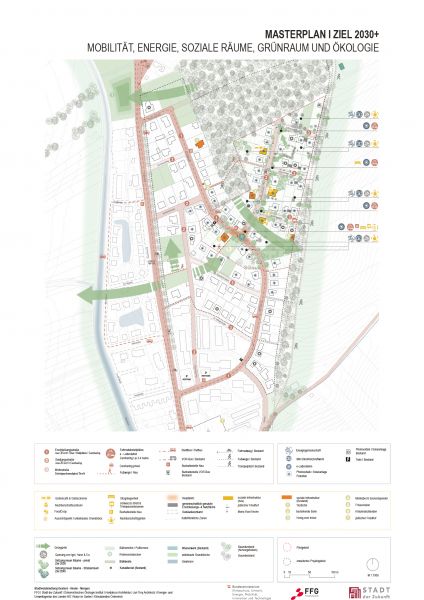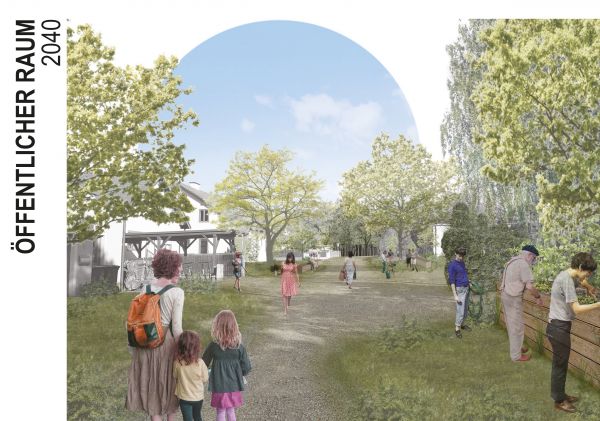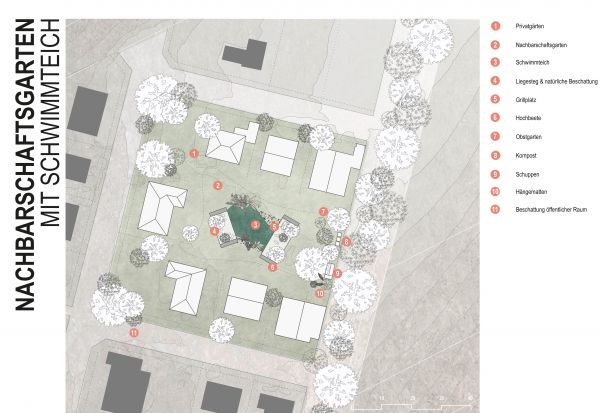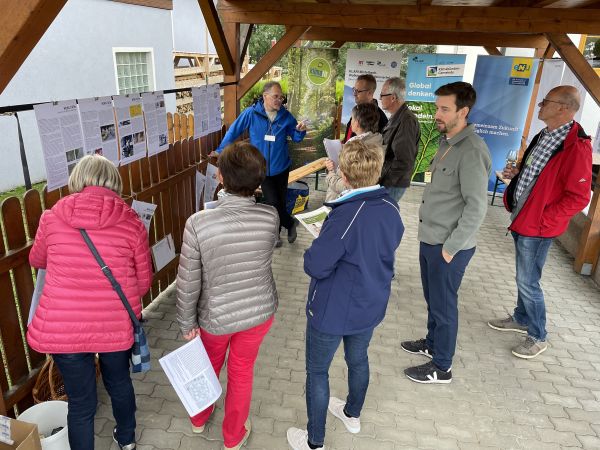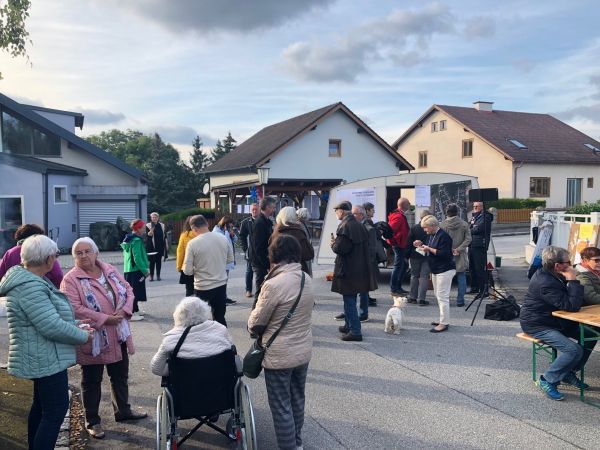ReHABITAT-Settlement: Sustainable rehabilitation and activation of a single-family housing estate in Mistelbach
Short Description
Status
Completed (December 2022)
Motivation and initial situation
Fortunately, more and more municipalities are striving for climate, soil and environmental protection goals, writing them down in development concepts and joining various alliances. The renovation of the building stock also plays an important role in achieving these goals. However, the renovation rate has been stagnating at a very low level for years throughout Austria - especially in the single- and two-family house sector (1.4 %; cf. Amann 04/2020). There are many reasons for this, but they are not being specifically investigated. There is a lack of new approaches to motivate homeowners to renovate, and subsidies alone are clearly not enough. Instead, vacancies and underused buildings are on the rise. Municipalities that try to motivate owners to rent or sell vacant buildings are rarely successful. Moreover, the common definition of "sustainable renovation" falls short. "Sustainable" is primarily understood to mean the improvement of a building's energy efficiency, which takes into account ecological aspects, cost efficiency and the improvement of living comfort for the users. The claim to make more optimal use of existing living and development space is, if at all, only very weakly pronounced. Sufficiency strategies are disregarded; outdoor spaces, green and open spaces, climate-friendly mobility, social, community-building and community-promoting factors, and a settlement-wide view are usually completely missing. It is high time to take a broader view of the term "sustainable rehabilitation".
The exploratory project therefore addressed the following research questions, among others:
- How do you attract the interest of owners of single-family homes for a broad range of topics in the field of sustainable renovation that go beyond cost savings?
- How can owners of single-family houses be motivated to renovate and make better use of space? Or how can they be motivated to rent and sell if they do not have their own needs?
Project contents and objectives
The project pursued the goal of surveying and analyzing the potential of holistic sustainable renovation and housing activation of the pilot area "Oberer Stadtwald" and also to concretize and visualize it within the framework of an overall concept for the entire settlement. A holistic sustainable settlement redevelopment begins - long before the technical considerations of thermal redevelopment or building-ecological improvements - with the people, their needs and living situations. The approaches to action and possible renovation measures were developed in a participatory manner and were based on sufficiency. A holistic approach was understood to mean the reduction of all resource consumption, the reduction of living space per capita, the inclusion of private and (semi-)public green and open spaces, environmentally friendly mobility, the consideration of social, community-building factors and, last but not least, an expansion from the individual property to the settlement level. A section of a single-family house settlement in Mistelbach (Lower Austria), comprising 38 buildings from the 1970s to the 1990s, served as a pilot.
The overarching goal of the exploratory study was to sound out the possibilities and feasibility of demonstration projects in the pilot area.
Methodical procedure
The basis for a successful process was laid with innovative, community-building activities to establish contact and trust between owners, residents and the project team. A detailed analysis of the existing situation was followed by a public lecture evening, which introduced the variety of topics and possibilities for action for sustainable settlement redevelopment. In the next step, the needs and future visions of the residents were identified. This was followed by needs assessments and discussions with the participating households on sufficiency strategies, conversion options, space optimisation, biodiversity-promoting garden design and energy issues. Subsequently, the potential of the pilot settlement for functional and organisational mergers of optimised individual buildings (= building associations), for energy communities, jointly used green and open spaces, the redesign of public spaces, and for sustainable mobility was examined in a three-day settlement workshop. Among other things, ways of implementation were considered and the central pillars of the overall concept were defined. The customised options and utilisation concepts for house and garden at the plot level, as well as for the overall concept at the settlement level, were elaborated and presented in face-to-face meetings, as well as at a final event.
Results and conclusions
The results at the house and property level were extensive concept folders with plans and explanatory texts on the designs presented and on the possibilities for action in the areas of space optimization, energy and green space optimization.
At the settlement level, the result was, on the one hand, an integrated overall concept visualized by means of plans in A0 format, numerous A3 information posters and collages for the topics of energy, mobility, green space & ecology, and social spaces. On the other hand, it was an approach that could be transferred to other communities for an exemplary settlement redevelopment that saves energy, makes better use of space, keeps materials in circulation, promotes biodiversity, improves the microclimate, increases the health of people and the soil, encourages environmentally conscious mobility and, last but not least, strengthens the community of residents, thus sowing the seeds for new projects, ideas and activities.
It has been very successful in getting into conversation with the residents about holistic rehabilitation. However, this was much more difficult with ideas for community projects that go beyond the usual (e.g. mutual help, etc.). For innovative approaches such as community energy supply or car-sharing etc., it takes even more time to get into people's thinking and possibility space. Practical examples to better demonstrate the various advantages would be very helpful here.
The team benefited enormously from the interdisciplinary cooperation.
Outlook
Assuming the participation and initiative of the residents, the proposed overall concept could be implemented very well. Whether it will be successful in whole or in part will only become clear in the long term.
Thanks to the good preliminary work and the intensive exchange between the team and the owners it can be assumed that thought processes have been initiated and individual conversion proposals are being implemented also at the house and property level.
The transferability of the approach to other communities should be examined in the context of follow-up projects.
Project Images
Terms of use: The pictures listed underneath the header “Project Pictures” originate from the projects in the frame of the programmes City of Tomorrow, Building of Tomorrow and the IEA Research Cooperation. They may be used credited for non-commercial purposes under the Creative Commons License Attribution-NonCommercial (CC BY-NC).
Project Partners
Project management
Dipl. Ingin Julia Lindenthal, Austrian Institute of Ecology
Project or cooperation partners
- Municipality of Mistelbach
- Soil Alliance / Initiative of Climate Alliance Austria
- Energy and Environment Agency of Lower Austria
- Natur im Garten GmbH
- juri troy architects
- HARDDECOR ARCHITECURE
Contact Address
Austrian Institute of Ecology
Dipl. Ingin Julia Lindenthal
Seidengasse 13/3
A-1070 Vienna
Tel.: +43 (6991) 523 61 11
E-mail: lindenthal@ecology.at
Web: www.ecology.at

